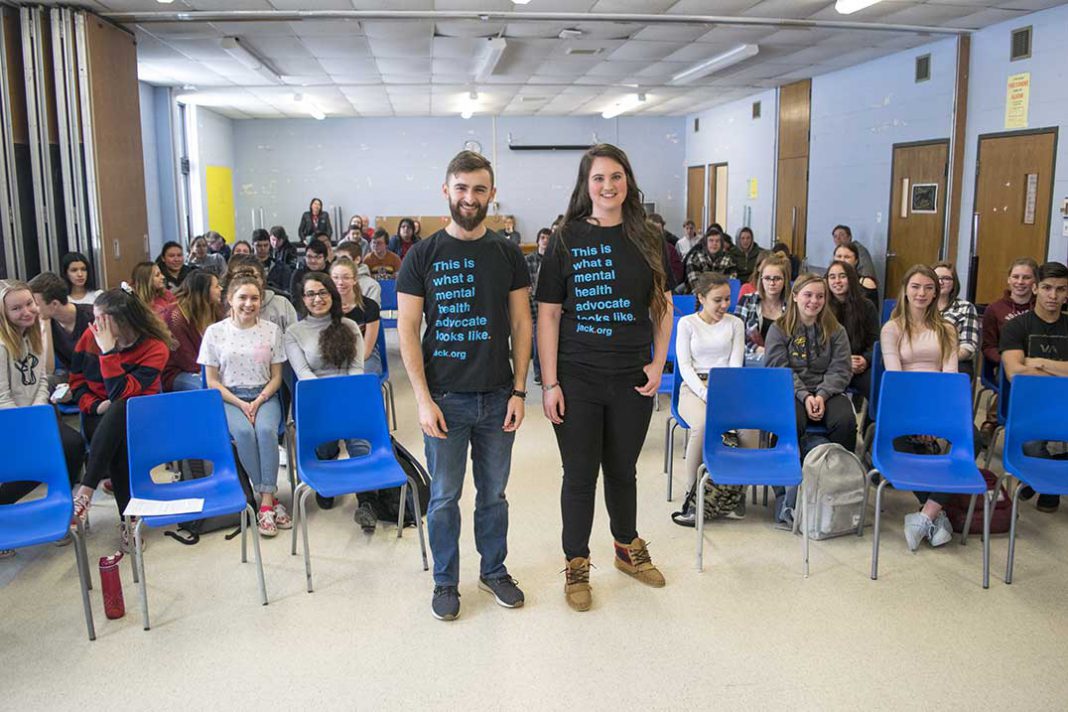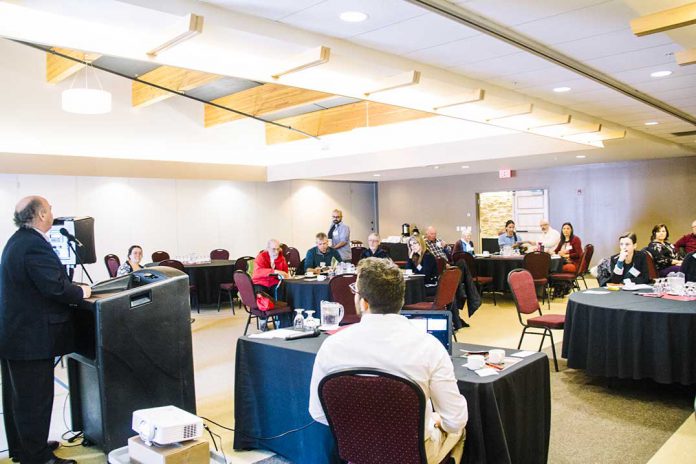M’CHIGEENG—Grade 11 and 12 students at Manitoulin Secondary School (MSS) were treated to a unique JackTalks presentation recently from Yasseen Tasabehji and MSS graduate Ashley Quackenbush, representatives from mental health advocacy organization Jack.org.
“I wanted to be able to share my story, get involved and help others,” said Ms. Quackenbush. “I am Jack.org’s first and only speaker for the Manitoulin and Sudbury districts.”
Ms. Quackenbush also goes by the stage name DJ Scratchley Q and works as a professional disc jockey, a job that has brought her many unique experiences including being the opening act for the Ottawa-based Indigenous music group A Tribe Called Red.
Jack.org is named after Jack, a student at Queens University who suffered in silence from mental illness and eventually decided to take his own life. His parents started the organiation five years ago in the hopes of promoting mental wellness so that no other families would have to go through the same tragedy.
This is Ms. Quackenbush’s first year as a JackTalks presenter and Mr. Tasabehji has been affiliated with the group for a year and a half. He was born in Damascus, Syria, and later moved to the Toronto area when he was 17 years old.
Ms. Quackenbush contacted Alison Orford, the social worker at MSS, who invited the organization to speak at the school. She also forwarded the opportunity to the rest of the school board and now Mr. Tasabehji and Ms. Quackenbush are speaking at all nine high schools within the Rainbow District School Board (RDSB).
“My hope would be that these students can trust that it’s not a big faux pas to talk about mental health. Everyone has mental health; some days it’s good, other days it might be tougher. And there’s help for when things get tough,” Ms. Orford said.
Ms. Quackenbush and Mr. Tasabehji opened the session with an icebreaker game of ‘two truths and a lie,’ in which both presenters offered up three facts about themselves and the audience had to guess which one of the three was a lie.
Next, they showed a video about how much power silence can have over someone, as well as the difficulties that are associated with remaining silent on an issue. It left the students with the lasting message that “silence is made to be broken.”
The discussion shifted to the similarities and differences between a healthy body and a healthy mind.
“It’s easy to pinpoint what it means to have a healthy body but it’s harder to find out what it means to have a healthy mind,” said Mr. Tasabehji. “One in five Canadians will struggle with their mental health. If the four can help the one, then the one can help four someday.”
They elaborated on the difference between mental health and mental illness—often when people think of the phrase mental health they think of negative conditions such as anxiety and depression, when the term mental health as a whole also includes a positive outlook and good health.
Ms. Quackenbush then brought the group onto a more personal level and shared her own struggles with her mental health during high school and after graduation as a new Toronto resident trying to break into the competitive world of DJing. She started seeing a professional to help her and that started her on the road to recovery.
“It may seem awkward and difficult to open a positive conversation,” she said.
“If we change the way people talk about it … the stigma changes,” added Mr. Tasabehji.
He described mental health as lying along a four-point spectrum: Someone who is mentally healthy or stressed is in a relatively good position, as they can use their own coping mechanisms to provide themselves support to get through their challenges. Further down lies struggling, in which someone would need some assistance to improve their mental health or else they could dip into the low end of the spectrum, a mental health crisis.
“That’s when it starts affecting the things you’re doing in your life. One way to identify a crisis is when there’s a risk of harm,” Mr. Tasabehji said.
He then described the five golden rules for helping someone or offering support to an individual in need: Say what you see, show that you care, hear them out by listening to their concerns, check yourself to make sure you’re not coming from a place of judgment or rejection and connect them to the appropriate resources they need.
Some of the resources for support can include trusted family members or friends, elders or community leaders, a counselling centre, family doctor or an anonymous helpline such as Kids’ Help Phone. The Kids’ Help Phone website also features a list of support resources for various jurisdictions.
There were also representatives from Noojmowin Teg Health Centre and M’Chigeeng Health Centre available in case the students had any questions they wanted to ask at the event.
“Do something today that your future self will thank you for,” said Ms. Quackenbush, emphasizing the need for a strong base to provide support during challenging times.
“Life will not always be kind later. Build those support systems now so you can use them when you need them,” she said.
There are currently about 250 Jack.org speakers across Canada and Ms. Quackenbush encouraged passionate students to look into the program because of the lack of representatives from Northern Ontario.
“You know more about your own communities and your schools. You know more about what people need here,” she said.
Finally, the two played a video that highlighted some of the things young people have accomplished through the Jack.org program before the students had to head to their next classes.
“It feels good to be home, but it’s a bit nerve-wracking. It gives me a sense of pride because I’ve gone off and experienced things, so now I’m bringing that back and sharing my story,” Ms. Quackenbush said.
“Students around here don’t have the same resources as a big city, especially when thinking of the large Anishinaabe population. That often gets forgotten, that people have to drive to the cities to get the same treatment.”
The students seemed happy to hear the messages that the speakers brought, as they were eager to answer questions and interact with the themes of the presentation.
“This was one of the best groups I’ve presented to,” Mr. Tasabehji said after the session.
There are many helpful resources available if you or someone you know is struggling with mental illness. Kids’ Help Phone offers free, confidential services 24/7 over the phone, text messages or online chat. It also offers lists of youth support programs based on your location, with 53 services located on Manitoulin Island.
All this information can be accessed at KidsHelpPhone.ca or by calling 1-800-668-6868. Post-secondary students can find similar help at Good2Talk.ca or by calling 1-866-925-5454. Adults in Northern Ontario can find support through Beendigen Inc., also known as Talk 4 Healing. Its phone number is 1-855-554-4325 and offers services in English, Ojibwe, Oji-Cree and Cree.





